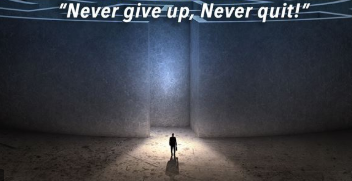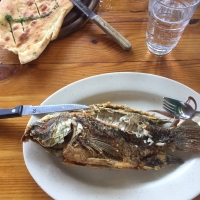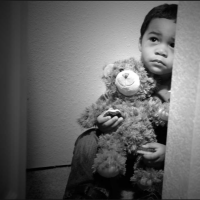What is it like to be unfamiliar with the warm security of the love of a fellow human? I can’t say for sure, but I imagine it to be like an arctic tundra: cold, barren, non-nourishing, and no particular points of interest. Except worse. No hope of a home somewhere offering relief.

Ever felt like that? I don’t know many, if any, people for whom this is truly accurate, but I’m afraid I know lots of people who have experienced this at some point, at least for a moment. Sometimes I’m the “victim” and sometimes I’m the “perpetrator.” When a loved one dies, when parents divorce, when someone chooses something else over their relationship with you. The cold, biting wind of loneliness is not deterred by anything you can wear, or drink, or eat. It goes right through – chilling your soul. Even people can’t necessarily shield you from it. Sometimes they only make it worse.

Sometimes the more they try, the worse it is. Like unwanted charity. Like someone trying to force the introverted child to play silly games with the loud kids at a birthday party.
The illusion of being unloved is, by and large, an illusion. Another way people suffer under this illusion is by not recognizing the love offered to them. The foster child sometimes falls into this trap with his foster parents, because based on real experience, he is convinced that no one actually cares, even when they act like it. The child who is bullied and picked on is subject to this misunderstanding because she sees her friends laughing at her at lunch time, and then when someone shows real love, she refuses to let them get close enough to hurt her like the last ones did. Or the son or daughter who has “changed” to the point that they feel like they can’t go home to a family with open arms.
YOU are worthy of love.
Your love may show up in a different way than you imagined; someone may be showing it in an unexpected way. But this idea that you are so different that you can’t absorb love is a lie. Don’t believe it.
I feel compelled to help others pull together when and where I can. Because relationships shouldn’t be given up over things smaller than the relationship. Race issues, culture issues, lifestyle issues, momentary offenses costing a lifetime of grudge and dissonance. These things shouldn’t dissect otherwise close relationships.
Don’t sacrifice the comfortable and healing presence of a loved one to your own pride, or your inability to bridge the gap that has grown between you.
There are professionals that can help. Counselors and Therapists can help you cope with the weight you carry, and Conciliators (me, for example) can help you find a remedy to the dispute, patch and heal the broken relationship, confess and forgive wrongs and hurts, and restore love and trust.
I recently read Metamorphosis by Franz Kafka. Written in 1912 Germany, this is a classic piece of 20th century literature. The first sentence says it all, and yet reveals very little:
One morning, as Gregor Samsa was waking up from anxious dreams, he discovered that in his bed he had been changed into a monstrous verminous bug.
In Metamorphosis, Gregor Samsa is a young man who lives with his mother, father and sister. Initially – as in before the story even starts – he is the breadwinner for this lower middle class German family, and he takes some pride in his winning of the bread. Father is old, overweight and mostly unable to work, Mother has little marketable skill, and sister, though intelligent and talented with a violin, again isn’t able to pay the bills. So you would think that the breadwinner turning into a “verminous bug” would be devastating for the family. Dark, right? But by the end of the book, this very misfortune is what turns the family around and leads them into better times, more prosperity, happiness and contentment. Happy, yes?
Gregor was waking up from anxious dreams and found himself to be a verminous bug. I wonder why he was so anxious? Had he long desired to be someone, or something else? Eager to escape the pressure of his human role, maybe? Did he feel that he didn’t fit in or wasn’t understood to the point that those anxieties manifested in this way?
We all have inclinations and predispositions, some of which we suppress and some of which we entertain and even indulge. Sometimes we give ourselves over to them. They can be good, bad, saintly or sinful. To some the inclinations will be disgusting; to others, irresistible. Gregor’s was disgusting, even to himself at first, but the more he was what he couldn’t avoid, the more comfortable he was in his own body. Within weeks he went from not knowing how to move his multiple, skinny, disproportionately sized, bug legs to being able to scamper across the ceiling with them. Are those who have an unexplainable, unavoidable desire to be a different gender or to couple with the same gender any worse than those who use lies to escape difficult situations or to get ahead? Both actively choose “sin,” right? Both make it a lifestyle, correct? But lying is SO much more acceptable, as is greed, lust, etc.

So really, is it a choice, or were they “born that way?” I can’t say I know, truly. I suspect that it falls into the irresistible urge or inclination category. I can’t really say exactly when it began, but I have always liked Oreos. It wasn’t a problem early on; but as I got older and had the freedom to act on it when I wanted, I started gaining weight. I finally realized a had a problem. Gluttony? Must we use THAT word? Love is Love, right? All that sugar when your body isn’t made for it is bad. It screws up bodily functions, size and shape, and that starts affecting even your relationships. Too much sugar keeps my medications from working correctly and that leads to more problems. I suppose I choose it, but sometimes I can’t seem to resist that inclination. It is almost as if IT chose ME. Sin? Yes. Against God’s will? I’m sure of it. Against the 10 Commandments? Depends on interpretation. Does that mean it is ok? Not so much.
In Kafka’s book he shows three classic responses to the “coming out” of any particular individual. The dad simply wants to kill the bug. Dad no longer saw him as his son so much as a different entity altogether. Looking from the outside in, it seemed a little too easy to let Gregor go once he was repulsed and couldn’t understand. This is such a common response. I can hear a Dad put his deeper emotions aside and say “Get out of my house! You’re not the man I raised.”
Gregor’s mom, on the other hand, is so very shocked and dismayed that she initially faints. After being overwhelmed with the magnitude of it all, Gregor’s mom finally mustered up the courage to visit her poor son, but still just couldn’t quite stomach the transformation. She fought hard to accept her son for what he was, but this was just not what she planned for and as much as she wanted to keep her son, she could not accept what he now was.
Gregor’s sister’s name was Grete. I want to be a Grete. I want to help people through their struggles and let them work the struggle out with the Creator. Grete saw the verminous bug in the adjoining room of their small apartment as her brother, regardless of his new look and changed behavior. She continued to love him and she tended to his needs when others couldn’t do it. She communicated with him when the others wouldn’t or couldn’t. She worked at maintaining the relationship that God built, in spite of the circumstances.
Gregor’s behavior changed through the story, as much as his body did. At first he was confused and didn’t know what to do with these new feelings and inclinations. He didn’t know how to move about and could hardly stand to see himself in a mirror. (take that both ways) As time moved on, he came to accept that which he couldn’t control, and finally, reluctantly, embraced it to the point he didn’t feel like he had to stay hidden. He came out. That didn’t work out well for Gregor because he was the only dynamic character in this story. When he scampered into the living room, a tragic, traumatic, but understandable show of panic ensued. In the ruckus, Dad hit him and injured him. Arguably, he became too bold with himself, parading himself around more than his loved ones could tolerate when he was quite aware of how it made THEM feel. He never recovered from his father’s attack.
Life is difficult for both sides of the equation, and neither side should discount the other’s struggle. I really wish all this was as simple as “I was born this way,” or “He chose a sinful lifestyle so He should be shunned.” But I am convinced that this is no easier for the LGBTQ community than eating less or buying less or giving up income or swallowing self-righteous pride for anyone else.

I choose to be the compassionate one. I’ve learned some hard lessons in that just recently, at lots of people’s expense. I am trained as a conciliator and mediator and I have seen one too many families destroyed as was Gregor’s. I want to help people keep their families and friends when it is possible. It wasn’t just that Gregor became a bug, but that everyone failed to accept him and they all lost compassion for one another. The loss of compassion and the resulting rejection and injuries are what killed the family. It didn’t have to happen. It doesn’t have to happen. We can re-learn to love but we have to love enough to try. I believe I can help with that, and I’m going to continue trying.












David-you never cease to amaze me that one of your blogs will touch me at just the needed time, as this one did. Struggling to bridge a family divide and holding a grudge and not figuring out how to “fix” it are consuming more time than I want—thank you for shining a light to the right path.
LikeLike
Thank you for telling me that.
LikeLike